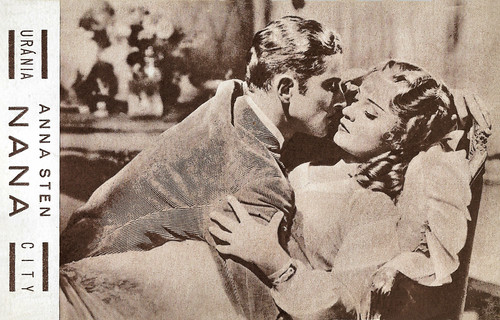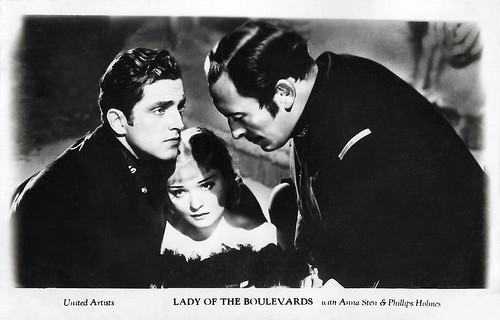
French postcard by Cinématograph-Edition, no. 2050. Photo: Metro-Goldwyn-Mayer.

Italian postcard by Cinema Illustrazione, Milano, series II, no. 26. Photo: Paramount. Nancy Carroll and Phillips Holmes in The Devil's Holiday (Edmund Goulding, 1930).

British postcard in the Picturegoer Series, London, no. 574. Phillips Holmes and Sylvia Sidney in Confessions of a Co-Ed (David Burton, Dudley Murphy, 1931). They also played together in An American Tragedy (Josef von Sternberg, 1931).

Hungarian postcard by Globus, Budapest. Photo: United Artists / City Film. Phillips Holmes and Anna Sten in Nana (Dorothy Arzner, George Fitzmaurice, 1934).
Playing male innocence and sensitivity, even hypersensitivity
Phillips Holmes was born in Grand Rapids, Michigan, in 1907. He was the son of actor couple Taylor Holmes and Edna Phillips. He also had a sister and a younger brother, Ralph Holmes, who also became an actor. They also had Canadian citizenship through their mother. The children were often shunted about to live with various relatives while their parents were on the road.
Phillips attended many different schools growing up and graduated from Newman Prep School in New Jersey. He had his first experiences in the film world as an extra in his father's silent films, in 1918 and 1925. He studied at Trinity College in Cambridge and the University of Grenoble in France. He completed his education in 1928 at Princeton University in New Jersey. An inherent interest in acting led to his stage debut in the Princeton Triangle Show 'Napoleon Passes' (1927) at the Metropolitan Opera House. In it, he played the female lead. While at college he also managed to make his film debut with the silent film Varsity (Frank Tuttle, 1928), starring Charles 'Buddy' Rogers.
As a result, Paramount offered him a contract. He initially worked at the company's Astoria Studios in New York. During this early period, he was also offered a stage role in the theatrical production of 'The Silver Chord'. This combination of film and stage work, and the efforts to prove himself, became too much for him and he suffered a nervous breakdown. A six-week hospitalisation was needed to help him recover. In 1929, he had some good supporting roles, including one in The Wild Party (Dorothy Arzner, 1929), Clara Bow's first sound film. He was the juvenile lead in The Return of Sherlock Holmes (Basil Dean, 1929) with Clive Brooks as Holmes, He then got his first leading role in the silent Western Stairs of Sand (Otto Brower, 1929) with Wallace Beery and Jean Arthur. His first leading role in a sound film was in Pointed Heels (A. Edward Sutherland, 1929) with William Powell and Fay Wray.
In the early 1930s, Phillips Holmes became a popular film actor, who received good reviews. He blonded his hair, and in his film roles, he often played male innocence and sensitivity, even hypersensitivity such as in The Devil's Holiday (Edmund Goulding, 1930), with Nancy Carroll. He did not make it laughable, but tender and believable. This film was a financial and artistic success and marked his breakthrough. Holmes and Carroll starred together in two other films, Stolen Heaven (George Abbott, 1931) and Broken Lullaby (Ernst Lubitsch, 1932).
Soon he was offered important roles. He starred in the detective comedy Grumpy (George Cukor, 1930) with Cyril Maude, and in the drama Man to Man (Allan Dwan, 1930) with Grant Mitchell. In 1931, he had a major role in director Howard Hawks' prison film The Criminal Code, alongside Walter Huston. Like other prison films of the 1930s, The Criminal Code encouraged its viewers to question the contemporary American legal and penal systems.

British postcard in the Autograph Series, London, no. A 10.

British postcard in the Film Partners Series, London, no. P45, London. Helen Twelvetrees and Phillips Holmes in Her Man (Tay Garnett, 1930). In this pre-code movie, a Havana prostitute (Twelvetrees) with a sadistic "protector" (Ricardo Cortez) falls for a young sailor (Holmes).

British postcard in the Film Partners Series, London, no. PC 38. Phillips Holmes and Miriam Hopkins in Two Kinds of Women (William C. de Mille, 1932).

British postcard in the Picturegoer Series, London, no. 487a.
Struggling with alcohol and depression
At Paramount, Phillips Holmes acted mainly in melodramas. In 1931, he starred opposite Sylvia Sidney and Frances Dee in Josef von Sternberg's An American Tragedy. It was the most ambitious role of his career and the film became a box-office success. He then played a memorable lead role in one of Ernst Lubitsch's least successful films, the pacifistic drama Broken Lullaby (1932) starring Lionel Barrymore. Holmes had by now shown that he was more than just a handsome young man. He was a quiet actor whose characters often emerged emotionally deeper than the role seemed to demand. However, he never achieved superstar status. In 1932, his contract with Paramount Pictures expired. The popular sports and crime film 70,000 Witnesses (Ralph Murphy, 1932) was the last film he made under his Paramount contract.
He was given a one-year contract at Metro-Goldwyn-Mayer. He got a leading role in the thriller Night Court (W. S. Van Dyke, 1932) with Walter Huston and it became a box-office success. In 1933, he got a small supporting role in the successful film Dinner at Eight (George Cukor, 1933). He starred with Irene Dunne in The Secret of Madame Blanche (Charles Brabin, 1933) and with Warner Baxter and Myrna Loy in Penthouse (W. S. Van Dyke, 1933). In Men Must Fight (1933), about a war breaking out in the year 1940, he played a young man who enlisted as a pilot. It was a fate that awaited Holmes when World War II broke out. In 1933, Holmes was driving with actress Mae Clarke when he crashed into a parked car. Clarke, who suffered a broken jaw and facial cuts, sued Holmes for US$21,500 (equivalent to $522,246 in 2024), claiming that he had been driving while drunk. Clarke dropped the suit when Holmes agreed to pay her medical expenses.
Phillips Holmes starred in the big-screen film Nana (Dorothy Arzner, George Fitzmaurice, 1934) starring Anna Sten. This version of Émile Zola's 1880 novel and heroine was to be the vehicle for Sten's triumph as Samuel Goldwyn's trained, groomed and heavily promoted answer to Greta Garbo. But the film was a box-office disappointment. In his private life, Holmes struggled with alcohol and depression. His acting talent was best demonstrated in dramatic roles, rather than comedy. But from 1934 he starred in several unsuccessful films and occasionally in unimportant B-movies and comedies in which he had little opportunity to show his acting talent. One of his last really interesting roles was in the drama film Chatterbox (George Nicholls, Jr., 1936) with Anne Shirley. His final American movie was the comedy General Spanky (Fred Newmeyer, Gordon Douglas, 1936), a spin-off of Hal Roach's popular Our Gang short subjects, starring George 'Spanky' McFarland.
Holmes ended his film career with two English films, the comedy The Dominant Sex (1937) with Diana Churchill and the comedy-drama Housemaster (1938), both by Irish director Herbert Brenon. He was 31 at the time but with no further film prospects. He went on to act on stage in the United States. On Broadway, he starred in 'Golden Boy' (1938), and with his father and his brother Ralph in 'Journey's End' (1939). He then starred in 'The Animal Kingdom' (1939), 'The Male Animal' (1941) with Celeste Holm and David Wayne, and finally in 'The Philadelphia Story' (1941). Holmes continued his theatre work until the attack on Pearl Harbor in December 1941.
Then he joined the Royal Canadian Air Force, following in the footsteps of his brother Ralph who was a pilot officer. After some ground training in Winnipeg, he was sent to Ottawa with several other graduates. Their plane collided with another Air Force plane at Armstrong in northwestern Ontario, near Thunder Bay, in 1942. There were no survivors. Holmes was 35 years old. The funeral mass was held at St Patrick's Cathedral in New York and he is buried in the Gate of Heaven Cemetery in Hawthorne. Today, it is believed that Holmes was homosexual. In the early 1930s, he was still living with his family in Los Angeles in the house where he had spent his childhood. Around 1938, he had an affair with the singer and actress Libby Holman, who also had sexual relations with women. He moved in with her, but Holman subsequently married his brother Ralph. Ralph Holmes would commit suicide in his NY apartment from a barbiturate overdose in 1945, three years after Phillips' death. Phillips Holmes has a star on the Hollywood Walk of Fame.

British postcard in the Picturegoer Series, no. 487.

British postcard, no. 171. Photo: Radio Pictures (RKO).

British postcard in the Film Partners Series, no. P38. Phillips Holmes and Miriam Hopkins played together in Two Kinds of Women (William C. de Mille, 1932).

German postcard by Ross Verlag, no. 6894/1, 1931-1932. Photo: Paramount. Phillips Holmes and Miriam Hopkins played together in Two Kinds of Women (William C. de Mille, 1932).

British postcard in the Filmshots series by Film Weekly. Photo: United Artists. Phillips Holmes, Anna Sten and Lionel Atwell in Nana (Dorothy Arzner, George Fitzmaurice, 1934).
Sources: Gary Brumburgh (IMDb), Wikipedia (Dutch and English) and IMDb.
No comments:
Post a Comment